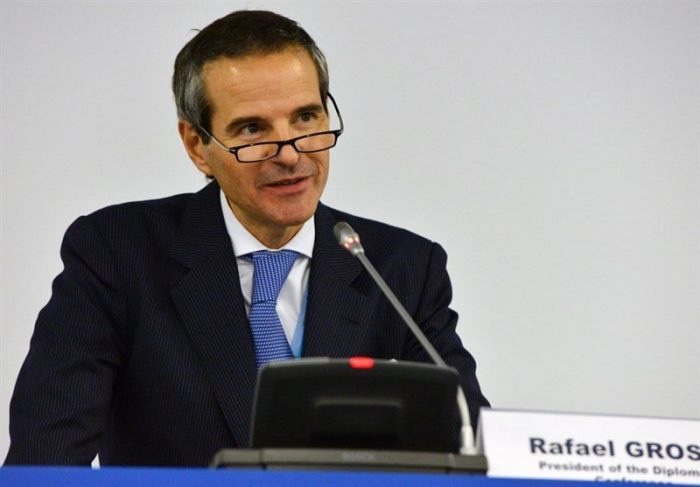IAEA chief warns against military strike on Iran
“A military attack would be detrimental to any inspection activity, let alone the safety of my inspectors,” Rafael Grossi told NBC News in an interview.
Keir Simmons is a London-based foreign correspondent for NBC News.Saphora Smith is a London-based reporter for NBC News Digital. Laura Saravia is a producer based in London.
Nov. 19, 2020, 6:30 AM MST
The head of the U.N. watchdog responsible for inspecting Iran’s nuclear program has warned against launching a military strike on Iran.
“I would hope there would never be a time for a military attack,” the director general of the International Atomic Energy Agency, Rafael Grossi, told NBC News in an interview Wednesday in Vienna.
His comments come after The New York Times, citing four current and former U.S. officials, reported Monday that President Donald Trump had asked advisers last week what options he had to take military action against Iran’s main nuclear site.
Director General of the International Atomic Energy Agency Rafael Mariano Grossi.Christian Bruna / Reuters
During a meeting last Thursday, a range of senior advisers dissuaded the president from moving ahead with a military strike, the Times reported. NBC News has not independently verified the reporting.
Grossi called suggestions that America was considering such an attack “total speculation.”
“A military attack would be detrimental to any inspection activity, let alone the safety of my inspectors, which is the first thing I have to think about if somebody is planning to do something like that,” he said.
Download the NBC News app for breaking news and politics
Tensions between the U.S. and Iran have escalated since 2018 when Trump walked away from the landmark 2015 nuclear deal struck by his predecessor, Barack Obama. The U.S. has pursued a campaign of maximum pressure on Iran, imposing sanctions that have helped devastate the Iranian economy and sent the local currency into free fall.
In response, Iran — which has always denied it is seeking a nuclear arsenal — has slowly abandoned the limits set by the deal.
On Wednesday, the U.S. hit Iran with another round of sanctions, with the Treasury announcing that it had targeted an important Iranian charity, as well as a number of its affiliates. The Mostazafan Foundation is suspected of providing material support to Iranian Supreme Leader Ayatollah Ali Khamenei for malign activities, including for the persecution of the “regime’s enemies.”
Iranian Minister of Intelligence Mahmoud Alavi attends a session of Iran’s Assembly of Experts in the capital Tehran.Atta Kenare / AFP – Getty Images file
The Treasury also targeted Iran’s minister of Intelligence and Security, Mahmoud Alavi.
Many of the sanctions supplement previously announced penalties by simply adding another layer to them, according to The Associated Press. However, they come as the Trump administration appears to be trying to lock in its policy toward Iran before President-elect Joe Biden takes office.
The IAEA has reportedly set out ways in which Iran is no longer adhering to the nuclear deal, officially called the Joint Comprehensive Plan of Action.
Other signatories to that agreement — the U.K., France and Germany — called on Iran Thursday to “reverse its steps and return to full compliance.”
The statement follows an internal IAEA report that said Iran breached the nuclear deal by using advanced uranium-enriching centrifuges that it had installed underground at its Natanz site.
Referring to the report, Grossi added that Iran has not explained the origin of uranium particles found at an “undeclared” site. The organization’s inspection regime was robust, he said.
“There have been instances in the past where Iran did not declare things that it should have declared,” he said. “At the moment, I don’t have any indication that there is any secret activity that they are carrying out.”
An adviser to Iran’s Supreme Leader Ayatollah Ali Khamenei also warned Wednesday that an American attack on the Islamic Republic could set off a “full-fledged war.”
Hossein Dehghan, a former member of Iran’s paramilitary Revolutionary Guard, who served as defense minister under President Hassan Rouhani, told the Associated Press that Iran would not “negotiate its defensive power … with anybody under any circumstances,”
“We don’t welcome a crisis. We don’t welcome war. We are not after starting a war,” Dehghan said. “But we are not after negotiations for the sake of negotiations either.”
Reuters contributed to this report.

No comments:
Post a Comment